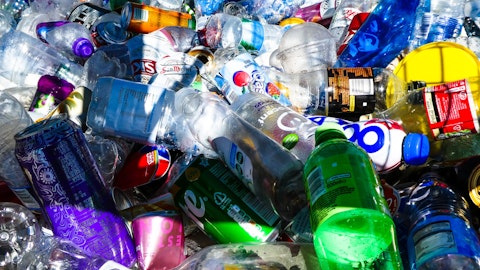Ray Hatch: Yes, I’m trying to figure out how best to answer that. First of all, your assessment is extremely accurate. The firm that had it before us was operating them totally separately. We’ve combined the sales force, the accounting. We’ve combined a lot of those aspects that they didn’t do, and we’ve already done that. As a matter of fact, I think we, from both sides of that business, have everybody aligned with the departments here at the core from a management standpoint or a process standpoint. But I would say that the side of the business that wasn’t really commodity related, it’s the side that does a lot of REITs in retail, that’s where most of the issues came from.
George Melas: Okay. And then I think you mentioned, Ray, that RWS was EBITDA positive for the full year. Was this over the slight loss in the second half?
Ray Hatch: No, no. I can’t remember how to explain exactly, but we definitely have an EBITDA positive. I don’t think it was negative. Was it, Brett, that quarter?
Brett Johnston: No.
George Melas: So it’s EBITDA positive every quarter?
Ray Hatch: I don’t know, George, specifically.
Brett Johnston: Yes, we wouldn’t break that down to that level. But again, we’re going to get back to where we originally thought that business would be by the end of this year. I think that’s the main takeaway, is we’re very positive on the acquisition overall with what we’ve been able to accomplish over the last quarter or so.
George Melas: Okay. And then maybe just one final one. I think like midyear, you guys had said that the first half of the year, from an EBITDA perspective, were sort of a run rate, to expect sort of something similar in the second half? Has there been a meaningful drop? And does RWS explain all that drop? Or were there some other factors that came in that sort of slightly lowered the forecast, I’d say?
Brett Johnston: Yes. RWS gets you most of the way there. Certainly, the seasonality that came in with Q4 makes up a large core of the rest of the business.
Operator: The next question comes from Gregg Kitt from Pinnacle Fund.
Gregg Kitt: I was a little bit unclear about RWS. You talked about that $1.5 million impact over the course of the year. But there was that positive benefit in Q2 and a negative impact in Q3. And so net-net, if I just looked at Q2 and Q3, that was a net positive surprise. And so when I think about the $1.5 million negative impact for the year, was a lot of that in Q4, like maybe $2 million, $2 million plus?
Brett Johnston: No, I would characterize back to the $1.5 million. Those items in Q2 and Q3 were really just adjustments, reconciling some item from previous quarters. So the $1.5 million is largely just the upside that we missed out on in the business and certainly would look at that as being more related to the second half of the year.
Gregg Kitt: Okay. And then on the commentary for January and February, and I heard that you’re expecting to get a little bit better as you cycle through some of the adjustments that you made to fuel surcharges, being able to pass those on. Absent any additional improvements, it sounded like what I heard was $12.75 million of gross profit on a run rate basis. And $9.75 million of SG&A, or non-GAAP OpEx is like $3 million plus whatever additional stock-based comp and adjustments gets you kind of to like the $4-ish million of EBITDA for the first quarter. Am I kind of like reading those pieces correctly?
Brett Johnston: I think that’s a fair assessment. Yes, certainly, January and February, it’s not meant to be guidance for the quarter, but really just to point out that the business has really stabilized coming out of Q4.





